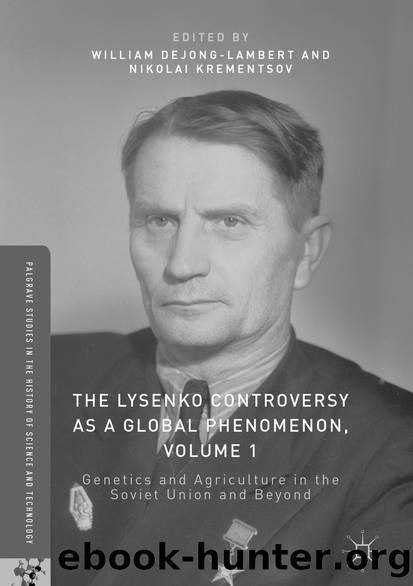The Lysenko Controversy as a Global Phenomenon, Volume 1 by William deJong-Lambert & Nikolai Krementsov

Author:William deJong-Lambert & Nikolai Krementsov
Language: eng
Format: epub
Publisher: Springer International Publishing, Cham
Conclusions
The NKZS was by far the most important promoter of Lysenko. Neither Lysenko nor the media pushed the ministry into embracing his work uncritically. The sources I have analyzed in this chapter strongly suggest that flawed decision-making at the NKZS stemmed from scientific incompetence, rather than pressure from the party-state. To make definitive statements on this question without additional material from the relevant Ukrainian archives is impossible. Further research should focus on the decision-making processes and structures within the NKZS of the late 1920s.
To this end, finding documents revealing how the scientific aspects of Lysenkoâs work were discussed internally by the NKZS is crucial. Two issues seem particularly important: One, how was the news of the discovery handled initially in mid-July 1929? Two, did someone suggest asking a scientific institute for assistance in the evaluation process, and, if so, how was this overruled? It is also crucial to find documents showing how the NKZS formally adopted decisions. 101 If further archival findings provide conclusive evidence of my view that the NKZS was ill-informed rather than pressured, Lysenkoâs father becomes a decisive figure in his sonâs rise to the heights of Stalinâs Soviet Union. By informing the NKZS, rather than a scientific institute about the result of his field experiment, he handed his sonâs seed treatment to a group of people unqualified to assess it. As pressure from the Moscow party elite as a significant factor for Lysenkoâs early success becomes less likely, individuals and organizations that have been largely ignored become more important. For instance, too little is known about the interactions of the NKZS with the UGSI during the second half of 1929. In this regard, finding archival material which would shed light on Sapeginâs contact with the ministry seems particularly promising. 102
The lesson to be drawn from the waste of Soviet agricultural resources and manpower as a result of the flawed decision-making at the NKZS is not so much about the professional competences state officials should have. Rather, it is about the administrative-political competences they should not have. By nature, bad decisions by state officials are never subject to the clear and unavoidable feedback that bad decisions made in the marketplace usually trigger. Had Soviet peasants been free from state coercion and worked for their own profit, vernalization would, without any doubt, not have been adopted at all or been disposed of much faster. Because every state administration has its share of incompetent and self-opinionated officials, perhaps we should be more alert about the possible âside-effectsâ of governments having, for instance, the authority to subsidize renewable forms of energy, or central banks having the power to create money out of thin air. Surely, reducing pollution and stimulating the economy are noble goals. But so was raising Soviet crop yields.
Download
This site does not store any files on its server. We only index and link to content provided by other sites. Please contact the content providers to delete copyright contents if any and email us, we'll remove relevant links or contents immediately.
| Africa | Americas |
| Arctic & Antarctica | Asia |
| Australia & Oceania | Europe |
| Middle East | Russia |
| United States | World |
| Ancient Civilizations | Military |
| Historical Study & Educational Resources |
The Third Pole by Mark Synnott(954)
Money for Nothing by Thomas Levenson(948)
The Economist (20210109) by calibre(937)
Christian Ethics by Wilkens Steve;(860)
Made in China by Anna Qu(855)
The Age of Louis XIV: The Story of Civilization by Will Durant(833)
Nonstate Warfare by Stephen Biddle(815)
Reopening Muslim Minds by Mustafa Akyol(813)
100 Posters That Changed The World by Salter Colin T.;(786)
The Shortest History of China by Linda Jaivin(779)
Culture by Terry Eagleton(776)
The Great Pyramid Void Enigma by Scott Creighton(761)
The Irish Buddhist by Alicia Turner(760)
Ideology by Eagleton Terry;(743)
Routledge Handbook of Contemporary India by Knut A. Jacobsen(742)
Sybille Bedford by Selina Hastings(690)
The Jews of Silence: A Personal Report on Soviet Jewry by Elie Wiesel(688)
Banaras: CITY OF LIGHT by Diana L. Eck(680)
Objects of Vision by Saab A. Joan;(670)
